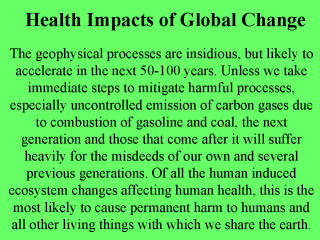 |
Stratospheric
ozone deletion has already led to increased UV radiation flux at the earth's surface that
is causing biospheric damage as well as elevated risk of skin cancer, cataract, and immune
system disturbances -- which might impair the efficacy of mass immunization programs if it
gets worse. The processes and forces involved in global change require more research to
clarify cause-effect relationships and identify effective strategies to counteract the
harmful effects[35]. Reductionist,
compartmentalized research approaches probably won't work: we need innovative,
transdisciplinary approaches [36], new coalitions
among biological, behavioural, physical scientists and people from outside the
conventional boundaries of scientific research. The issues involved in climate change are
so complex, the choices we must make are so difficult, that every aspect of human affairs
is affected. Economists, politicians, industrialists, labour union leaders, scholars from
the humanities, philosophers, and ethicists all have a role to play in confronting this
challenge and responding to it in an appropriate manner. This is a situation which evokes
Albert Einstein's phrase, "A new manner of thinking." Greenhouse gases that
cause global warming, and stratospheric ozone depletion due mainly to CFCs, prompted
international conventions aimed at mitigating adverse effects and minimizing harm. But
there are heavy political and economic costs of the necessary actions, so democratically
elected political leaders fear that they would not be re-elected if they were to take the
legislative and regulatory steps needed, such as imposing high deterrent taxes on
petroleum fuels. Democratically elected political leader are averse to making decisions
that have a time horizon further away than the beginning of the campaign season for the
next election. The present state of the world requires planning and decisions with a time
horizon of at least 50, preferably 100 years. |
